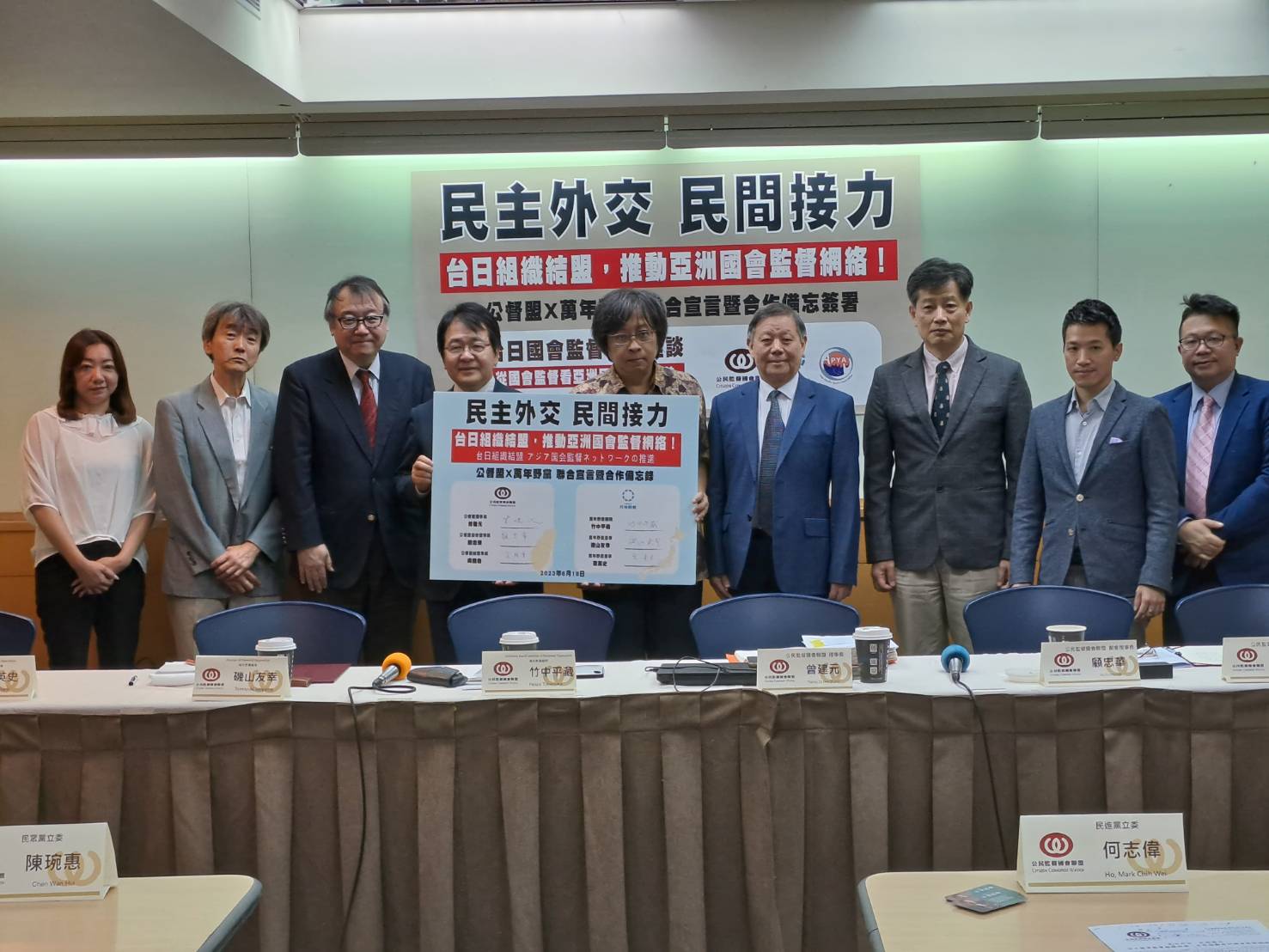【會後新聞稿】民主外交 民間接力 - 台日國會監督組織結盟 合作推動亞洲國會監督網絡
發布時間 2023.06.21, AT 02:27 AM

在現今亞洲地區的威權勢力不斷擴張下,「民主倒退」似乎成為不可逆的現象,成熟民主國家之間如何透過彼此間深化的交流與結盟,共築民主的防衛城牆,是台、日所共同面對的課題。特別是公民社會在其中所扮演的監督角色相當重要,因此台灣的公民監督國會聯盟於今日(6/19)和日本長期監督國會的非營利組織「萬年野黨」簽署共同宣言和備忘錄,共同推動亞洲地區的國會監督網路,強化各國民主韌性。
前日本國務大臣竹中平藏率領代表團訪台,交換監督國會經驗
日本監督國會團體-「萬年野黨」有鑑於國內在野黨和大眾媒體無法有效發揮其監督國會的效果,因此在2013年由日本產、官、學界的重要人士共同成立,期望扮演一個「國會外長期的在野黨」,以非營利組織(NPO)的角色監督國會,這次「萬年野黨」,由前日本國務大臣,現任世界經濟論壇董事會成員的竹中平藏先生(Heizo Takenaka)率領代表團來台,其成員包含:千葉商科大學教授磯山友幸(Tomoyuki Isoyama)、政策工房主席原英史(Eiji Hara)和政策工房首席研究員五島知佳(Chika Goto),此行主要目的是拜訪同樣長期關注台灣立法院的公民監督國會聯盟,交流雙方國會評鑑制度,並且簽署合作備忘錄,開啟台日監督國會團體的密切交流,讓兩國的民主制度更加茁壯穩健。
公民監督國會聯盟理事長理事長曾建元致詞提到:「台灣的監督國會軌跡是從1987年解嚴後,一路發展至今,逐漸形成傳統三權分立和第四權(媒體權)之外的『第五權』,也就是由民間監督國會,這必須建立在一個民主成熟的社會基礎上,才能做到公平合理的國會監督,根據經濟學人資訊社(EIU)所發布的報告,台灣的民主指數名列亞洲第一,公督盟在監督國會的領域上長期所發展出來的方法論也成為各國監督國會組織(NPO)取經的對象,這次很榮幸能和日本萬年野黨共同簽屬備忘錄,為東亞區域的發展和兩國民主深化共同努力。」最後曾建元理事長也引用前首相安倍晉三的話:「台灣有事就是日本有事 現在我們一起做事!」
萬年野黨顧問/前日本國務大臣竹中平藏表示:「目前全球都能感受到威權主義的不斷地擴張,在這點上日本也有很深的感受,我認為我們必須要更努力才能守護這得來不易的民主,過去我也曾任日本的國務大臣,在擔任政務官期間能清楚認知到議會在民主發展中是扮演相當關鍵的角色,因此萬年野黨成立,就是希望能藉由民間組織的力量來鞭策議會,使其能更加穩健;最後在面對全球的霸權主義威脅之下,我希望透過這次台日雙方監督國會團體簽屬合作備忘錄,能夠讓亞洲的民主更加成熟。」
萬年野黨董事/千葉商科大學教授磯山友幸提及:「日本的民主發展在戰後逐漸發展茁壯,我們一直認為這是理所當然,但近年來日本的民主面對相當多困境,包含:公民參與低落、第四權的監督效果不張,因此希望這次萬年野黨和公民監督國會聯盟的合作,能為全球的民主發展盡一份微薄的貢獻,也希望雙方監督國會的經驗能夠持續傳承下去。」
跨黨派立委見證監督國會新里程碑:台日合作啟動亞洲國會監督網路
公督盟長期主張「唯有正常國會,才有正常國家」,如何讓國會發揮效能,是所有民主國家的公民所關注的重要議題,因此除了透過法律讓國會議員自律外,來自公民社會監督所扮演的「他律」角色更是國會進步的關鍵,在本日(6/19)記者會中台灣的公民監督國會聯盟與日本的萬年野黨一同簽署共同宣言和備忘錄,並邀請我國各黨的民意代表擔任見證人,包含國民黨籍立委謝衣鳯委員、民進黨籍立委何志偉委員、民眾黨立委陳琬惠委員,以及時代力量立委陳椒華委員到場致詞。
國民黨籍立法委員謝衣鳯表示:「現今透過外部組織監督國會的機制和開放國會的概念,能讓更多新時代的政治人物有機會展現不同的樣貌給民眾檢視,雖然我現在立法委員,但過往也是長期擔任立院助理,因此在立法事務上相當嫻熟,我發現這幾年透過開放國會,或外部的國會監督機制評量,立法院的生態確實有產生不同的改變,選民也會透過國會頻道來檢視民意代表的表現,我們相信藉由民間公民組織對國會的監督能讓立法院更加進步,符合世界民主潮流。」
時代力量立法委員陳椒華認為:「監督國會在台灣的民主發展上是相當重要的一件事,時代力量的成立便是從太陽花學運後,公民參與政治所成立的政黨,過往時代力量也同樣在立法院內扮演充分監督政府的角色,同時我也很榮幸在第十屆立委評鑑中能夠獲得公督盟的優秀立委的肯定,也希望未來不管有沒有擔任立委的角色都能和民間組織共同合作發揮監督者的功用。」對於這次公督盟和萬年野黨的合作,陳椒華委員相信這對於促進台日民主發展將會有很大的助益。
民進黨籍立法委員何志偉認為今天是一個台灣跨黨派立委共同支持的合作,並提到:「不管哪一個執政黨都是必須面對公民監督,過往民進黨在野時,就和許多公民團體共同合作,試圖讓立法院更加透明,推動立法院議事直播,直到現在,我們也嘗試利用相關科技,讓民眾可以更清楚了解他的納稅錢花去哪裡,我相信透過公督盟的評鑑可以一整面去檢視台灣議會民主的發展,特別是在現今中共的威權擴張,以及烏俄戰爭的影響,這次台日國會監督團體的合作我相信是非常重要,並能促成亞洲民主穩定,希望讓兩國的民主更好!」
民眾黨立法委員陳琬惠則代表民眾黨不分區立委發言:「過往柯文哲主席對於公開透明一事就相當看重,因此在民眾黨首屆不分區立委海選,就必須簽署一個條款,若被公督盟評比為待觀察立委就必須辭職立委一職,而助理們也經常拿著公督盟的指標來檢視我的表現,過往本人和公督盟的淵源相當深,因為我過往在民間擔任自律聯盟的秘書長一職,而公督盟就是當中的成員,對自身組織的公開透明和責信也相當看重,因此我覺得公督盟是一股推動國會進步很重要的力量,而且根據我自己個人的觀察,公督盟也是不斷地進步,並延伸到監督地方議會上,對更多社會議題上持續發聲。」
本次的備忘錄簽署希望建立亞洲地區國會監督的國際合作框架,透過更緊密的台日雙方合作,來推動亞洲地區的國會監督網絡,其重點包含:不定時舉辦線上國會評鑑研討會、聯合舉辦台日優秀國會議員頒獎典禮,以及研究探討建立亞洲各國議會「自動評鑑資料收集程式」的可能性,並提供共同的資料集,從而使各國國會能夠提高透明度和效能,台日雙方期待藉由本次簽署合作備忘錄,強化兩國之間公民團體的交流,穩固民主的基石,並將雙方十多年來的國會監督經驗,輸出到亞洲各國,避免威權勢力反噬掉得來不易的民主果實。
台日國會監督交流座談,深化公民社會民主DNA!
根據今年初,經濟學人資訊社(EIU)所頒布的2022民主指數報告,台灣和日本分別位居亞洲國家前兩名,但不可忽視的現象是反民主的專制浪潮逐漸興起,近十多年全球民主指數不斷下跌,如何讓人民對國家民主制度重拾信任,是成熟民主國家所要面對的關鍵課題,因此台日雙方的民主交流,不能停留在官方層次,雙方民間團體的交流,才是深化彼此民主的重點,特別是在代表人民的國會上,公民社會如何扮演好監督者的角色變得格外重要。在本次雙方簽署合作備忘錄後,將有兩個場次的對外座談,分別是由日本前總務大臣竹中平藏先生和公督盟創會理事長顧忠華先生分享雙方這十多年來如何從監督國會看亞洲民主的發展與趨勢,以及萬年野黨董事原英史先生和公督盟執行長張宏林先生彼此分享雙方如何建立公民信任的國會評鑑辦法,公督盟期待透過此次的雙邊座談,讓台灣與各理念相近的國際夥伴間的強化交流合作,也讓更多民眾了解監督國會的重要性,一同加入守護民主的行列中,共同努力提升國會透明度、效能與展現強化民主韌性的決心。
直播連結:https://fb.watch/lfpKgSV_QP/?mibextid=Nif5oz
Democratic Diplomacy, Civilian Relay
The Parliamentary Monitoring organizations of Taiwan and Japan form an alliance and collaborate to promote the Asian Parliamentary Monitoring Network.
In the face of the continuous expansion of authoritarian power in the present-day Asian region, "democratic regression" seems to have become an irreversible phenomenon. How mature democratic countries can deepen their communication and alliances with each other to jointly build a defensive wall of democracy is a common challenge for Taiwan and Japan. The role of civil society, particularly in oversight, plays a crucial role in this process. Therefore, the Citizen Congress Watch in Taiwan and the long-standing monitoring organization "Perennial Opposition" in Japan signed a joint declaration and memorandum of understanding on June 19th today to promote the parliamentary Monitoring network in the Asian region, thereby strengthening the resilience of democracies in various countries.
Former Japanese Minister of State, Heizo Takenaka, led a delegation to visit Taiwan, exchanging experiences in parliamentary oversight
The monitoring organization "Perennial Opposition" was established in 2013 in Japan by influential figures from the business, government, and academic sectors, with the aim of serving as a "long-term opposition party outside the parliament." Recognizing the limitations of opposition parties and mainstream media in effectively supervising the parliament, they adopted a non-profit organization (NPO) approach to oversee the parliament. Led by Mr. Heizo Takenaka, former Japanese Minister of State and current member of the World Economic Forum Board of Directors, the delegation from " Perennial Opposition " visited Taiwan. The delegation members included Professor Tomoyuki Isoyama from Chiba Commerce University, Chairman Eiji Hara of the Policy Workshop, and Chief Researcher Chika Goto, also from the Policy Workshop. The primary purpose of their visit was to meet with the Civic Alliance for Parliamentary Oversight, an organization in Taiwan that has been consistently concerned with the Legislative Yuan. They aimed to exchange insights on parliamentary evaluation systems, sign a memorandum of understanding for collaboration, and foster close communication between the parliamentary oversight groups of Taiwan and Japan, ultimately strengthening the democratic systems of both countries.
The signing of this memorandum of understanding aims to establish an international framework for cooperation in parliamentary oversight in the Asian region. Through closer collaboration between Taiwan and Japan, the goal is to promote the parliamentary oversight network in Asia. Key points of the collaboration include organizing periodic online parliamentary evaluation seminars, jointly hosting award ceremonies for outstanding parliamentarians from Taiwan and Japan, and exploring the possibility of establishing an "automated evaluation data collection program" for parliaments in various Asian countries. Additionally, the memorandum envisions providing shared datasets to enhance transparency and efficiency in national parliaments. Both Taiwan and Japan anticipate that this memorandum of understanding will strengthen the exchange between civic groups in the two countries, solidify the foundation of democracy, and export their over a decade of parliamentary oversight experience to other Asian countries. The aim is to prevent authoritarian forces from eroding the hard-earned fruits of democracy.
Taiwan-Japan Parliamentary Monitoring Exchange Symposium: Deepening the Democratic DNA of Civil Society!
According to the 2022 Democracy Index report released by the Economist Intelligence Unit (EIU) earlier this year, Taiwan and Japan ranked among the top two countries in Asia in terms of democracy. However, it is important to acknowledge the emerging trend of anti-democratic authoritarianism. Over the past decade, the global democracy index has been steadily declining. Restoring people's trust in the democratic systems of their countries is a crucial challenge for mature democracies. Therefore, democratic exchanges between Taiwan and Japan should not be limited to official levels; the key lies in the exchange between civil society groups from both sides. Particularly in the parliamentary arena, the role of civil society in acting as effective overseers becomes even more important.
Following the signing of the memorandum of understanding between the two parties, there will be two public symposiums. One will feature Mr. Heizo Takenaka, former Japanese Minister of State, and Mr. Ku Chung-hua, Chairman of the Citizen Congress Watch, sharing insights on the development and trends of Asian democracy from the perspective of parliamentary oversight over the past decade. The other symposium will involve Mr. Eiji Hara, Director of the Evergreen Party, and Mr. Chang Hung-Lin, Executive Director of the Citizen Congress Watch,, exchanging their experiences on establishing parliamentary evaluation methods that foster public trust. The Citizen Congress Watch hopes that through these bilateral discussions, it can strengthen communication and cooperation with like-minded international partners in Taiwan. Additionally, they aim to raise awareness among the public about the importance of parliamentary monitoring and encourage more people to join the ranks of safeguarding democracy, working together to enhance parliamentary transparency, efficiency, and the determination to strengthen democratic resilience.